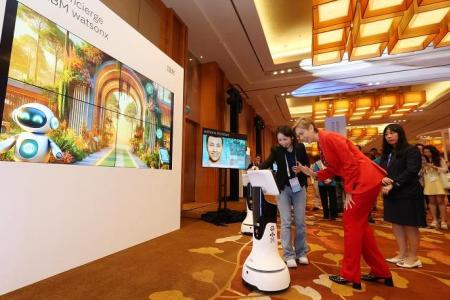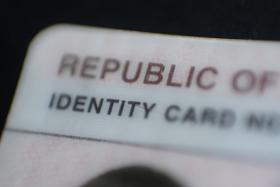IBM, NUS to set up new AI research and innovation centre
Green computing and artificial intelligence safety will be among the focus areas of a new AI research and innovation centre, which is expected to be set up at the NUS School of Computing by 2025.
The proposed centre, a collaboration between IBM and NUS, aims to accelerate scientific research here by tapping the American tech giant’s full-stack AI infrastructure.
Minister for Digital Development and Information Josephine Teo announced the new centre at the IBM Think 2024 event held at the Sands Expo and Convention Centre on Aug 15.
Mrs Teo described IBM as a longstanding partner of the Republic in the area of AI, with many of the firm’s efforts serving the public good.
This will mark the first time IBM’s full-stack AI infrastructure system – the entire spectrum of software and technology required to build, test and deploy an application – is installed on a university campus in the Asia-Pacific region.
The AI-optimised computing infrastructure will operate on watsonx, a data and AI platform developed by IBM, as well as the company’s Red Hat hybrid cloud platform.
Government agencies and companies, as well as academic and research institutions, will be able to take advantage of the new centre to conduct cutting-edge AI research that can benefit people, NUS and IBM said in a statement.
“The proposed collaboration would leverage NUS’ expertise to drive technological progress in AI, enabling more powerful, efficient and versatile AI systems that can tackle increasingly complex tasks,” they said.
The centre will take a sustainability-focused open innovation approach to developing AI technologies – incorporating ideas from both external and internal sources – which has greater potential to improve the quality and pace of adoption of new AI technologies, NUS and IBM added.
They hope to work together to develop tools and methodologies to help build trust in AI.
“IBM and NUS share a common goal to enable innovations in AI and sustainable computing, and we look forward to furthering this collaboration,” said IBM Research hybrid cloud and AI platform vice-president Priya Nagpurkar.
Professor Liu Bin, NUS’ deputy president for research and technology, said the university was “very excited” about the opportunity to collaborate with IBM.
“Building on the new NUS AI Research Institute announced earlier this year and the university’s commitment to green computing and sustainability, we aim to be the leading force in addressing rising industry demand for AI intelligence, cultivating a robust talent pool and contributing to Singapore’s decarbonisation efforts,” she said.
As part of efforts to grow local deep-tech start-ups, the collaboration will also allow the NUS Graduate Research Innovation Programme (Grip), together with local start-ups as well as small and medium-sized enterprises, to access technologies such as IBM’s watsonx platform and Red Hat OpenShift AI.
Grip is an initiative to help launch start-ups stemming from university research.
IBM and NUS did not say how much money was being invested in the new centre.
It is separate from the NUS AI Institute, launched in March, which conducts research on addressing ethical concerns associated with AI as well as the technology’s application across areas such as education and healthcare.
IBM was one of the university’s collaborators in the NUS AI Institute.
NUS said that while the two initiatives are separate, it expects “a lot of synergy” in the research efforts of the NUS AI Institute and the new centre.
Mrs Teo, who is also Minister-in-charge of Smart Nation and Cybersecurity, described the project as an example of how Singapore’s AI ecosystem is “steadily building up”.
The Government appreciates the potential for AI to serve the public good, she added.
She pointed to Readliao, an AI-enabled tool developed by Open Government Products – an independent division of the Government Technology Agency – which provides the elderly with simplified summaries of letters from the authorities, so they can better understand them.
“We will continue to bring together industry, government and academia for meaningful partnerships that we can all benefit from,” she said.
Get The New Paper on your phone with the free TNP app. Download from the Apple App Store or Google Play Store now


